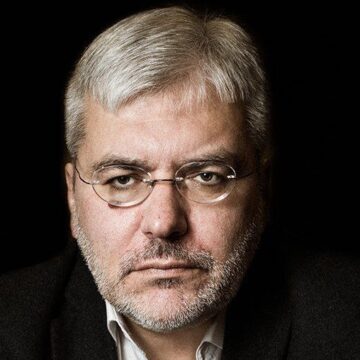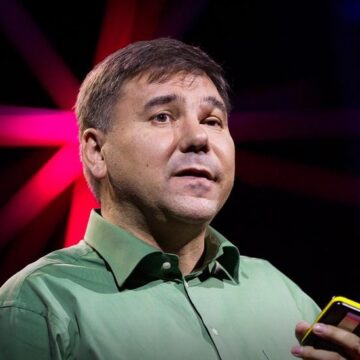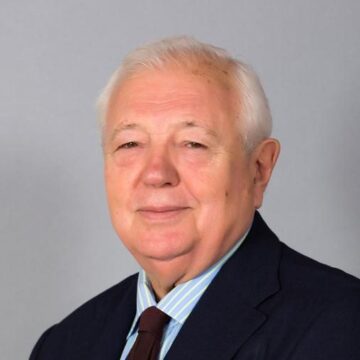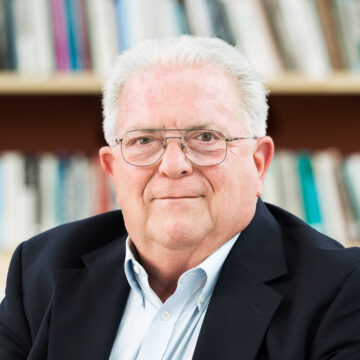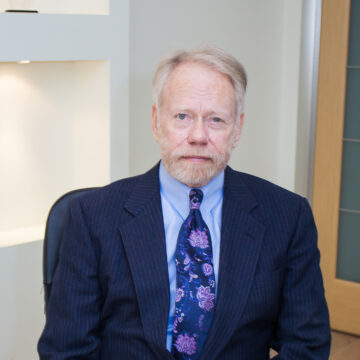For citation, please use:
Vodolazkin, Ye.G.; Krastev, I.; Mahbubani, Kishore; Turan, Ilter; Freeman, Chas W.; Wu Enyuan; Legvold, Robert, 2021. Thirty Years After: The Dialectics of Confrontation. Russia in Global Affairs, 19(4), pp. 122-136. DOI: 10.31278/1810-6374-2021-19-4-122-136
Yevgeny G. Vodolazkin
Writer
I have recently come across a remarkable phrase: “The only thing that divided us was our views.” It takes me back to the observation I made in the 1990s: in the muddled relationship of political views and temperament, the latter in most cases comes first.
In the whirlwind of change, I was surprised to see the communists dialectically turn into their opposites. Those who were nobody remained nobody, but top functionaries, who seemed to have been drowned, obstinately kept popping up to the surface like a bobber. Later, ultra-liberals became ultra-patriots, and vice versa. It was clear that ultra was the main element in these constructs, while the substantive part was only a supplement.
But none of this is in fact new. Great writer and unscrupulous politician Daniel Defoe liked to repeat that he always acted in accordance with his beliefs. The only flaw in this worthy position was that Defoe changed his beliefs with enviable regularity.
As is often the case, personal changes eventually manifested themselves at the macro level as well, for example, in international relations. The United States and the USSR, which had been trading recriminations in the ideological domain for decades, did not reconcile with the fall of communism in our country. Taken aback by the unexpected collapse of the Soviet Union, the two sides spent a couple of years in a state of indifferent equilibrium, but then reverted to their old ways with renewed vigor.
The engagement did not lead to marriage. We gave them Gorbachev and then Yeltsin (one being even more friendly than the other), but this did not make any impression. Paraphrasing the above comment, we can conclude that we were divided not only by our views. But it is not so easy to determine what exactly divided us. Was it the comparability of potentials, or the place in the global distribution of energy, or the bipolar structure of all things from magnetized sawdust under electrical load to the system of international relations?
Putin came to power with the idea of four common spaces with Europe: if my memory does not fail me, those were economy, law, security, and culture. And this was the last attempt at rapprochement. Sadly, as they used to say in memoirs in the past, we never became friends.
In fact, there was very little leeway and it led to confrontation. Politicians of the previous era such as Brzezinski thought quite mechanistically. They believed that by tearing Ukraine away from Russia, they would crush Russia’s potential. This did not happen, because the center of power is indivisible, and it remains in Moscow.
Similarly naive are those voices in the West that grieve over the fact that the victory in the Cold War was not brought to a logical end. The rapprochement of the parties, apparently, was impossible. But it was also impossible to wipe one of them off the political map, since there is no way you can remove one of the poles, just as you cannot delete a system file on your computer.


Ivan Krastev
Chairman of the Centre for Liberal Strategies, Sofia, Bulgaria; Permanent Fellow at the Institute for Human Sciences, Vienna, Austria
If we want to grasp why identity politics is at the core of international politics today, we should go back to the collapse of the Soviet Union.
On January 1, 1992, the world awoke to discover that the Soviet Union had vanished from the map. Without military defeat or foreign invasion, one of the world’s two superpowers had crumbled into dust. How can such an extraordinary turn of events be explained? The breakup happened contrary to all expectations that the Soviet empire was too big to fail, too rock-solid to disintegrate, and too nuked-up to be bullied by the West. The USSR had survived many decades of turbulence substantially intact. How could it implode essentially without warning when the majority of the people “didn’t even have the feeling that the country was falling apart”?


The Soviet decay was not a secret to anybody. But do the factors that explain the Soviet decay also explain the breakdown of the Soviet Union? Did the Soviet Union’s surprising collapse persuade us that it was inevitable?
Today, while trying to estimate the impact of the Soviet collapse on the international system we are becoming aware of a major paradox: it was easier to integrate the Soviet Union in the Western liberal international order than post-Soviet Russia and most of other new states that have mushroomed after the collapse of the communist empire. The Soviet Union was a post-national formation. Its survival after the end of communism depended on its ability to contain nationalistic and centrifugal forces. In this sense the Soviet leadership was much more ideologically aligned with the anti-nationalist ideologies that shaped the European Union in the 1990s than the new Russian leadership is today.


In the last thirty years, more new states have been created and destroyed in the old continent than in any region at any time—other than in Africa during decolonization in the 1960s. So, it was the collapse of the Soviet Union that is the most important factor explaining why nationalism and identity politics determine international politics. In the shadow of the Soviet collapse decolonization rather than the Cold War proved to be the most important development of the 20th century.
Kishore Mahbubani
Distinguished Fellow at the Asia Research Institute, Singapore


Well, there is some exaggeration here. The West has not destroyed itself. But it generated three seeds of self-destruction that continue to haunt the West three decades after the collapse of the Soviet Union.
The first seed of self-destruction was generated by the tsunami of hubris and arrogance that swept through Western minds after the Soviet Union collapsed. This hubris was best captured in the famous The End of History essay by Francis Fukuyama. As I document in Has the West Lost It?, this essay did tremendous brain damage to the West by putting the West to sleep at precisely the moment when the Asian giants, China and India, decided to wake up, in the early 1990s. The West had forgotten that China and India had been the two largest economies of the world from 1 to 1820. Their return was inevitable. Because of the post-Cold War arrogance in the West, the West failed to see that in the 1990s the key global dynamics was “the return of history,” not “the end of history.” Hence the West is lost today in dealing with the return of China.
The second seed of self-destruction was sown by the reckless expansion of NATO into the sphere of influence of the former Soviet Union. Why that happened in the 1990s remains a great historical mystery. Russia was clearly not a threat to the West. One diabolical theory is that the U.S. deliberately expanded NATO to make Russia the enemy so that the former “Western European” countries would remain beholden to the U.S. for defense. Only time will tell whether this diabolical theory is valid. Still, there is no doubt that at the end of the Cold War, the West lost a golden opportunity to create a “common home for Europe.”


The third seed of self-destruction was sown by the failure of the West to strengthen the 1945 rules-based order that the West had created, after the Soviet Union collapsed. Initially, President George H.W. Bush had offered to build a “New World Order.” Then, surprisingly, he lost the election in 1992. Still, his successor, Bill Clinton, wanted to build a stronger global multilateral system that would help the U.S. when it was “no longer the military, political, economic superpower in the world.” Unfortunately, as I document in The Great Convergence, Clinton failed to change the U.S. policy of weakening global multilateral organizations, like the World Health Organization (WHO). Future historians will therefore record that the world would have handled COVID-19 much better if the West had not gone about systematically weakening multilateral organizations like the WHO.
In short, the spectacular collapse of the Soviet Union should have seen a stronger West emerge three decades later. Instead, we see a divided and strategically lost West that is struggling to cope with a new world generated by the return of Asia, especially China. All three challenges could have been anticipated and dealt with. Sheer arrogance blinded Western minds. Now the West is paying the consequences for that.
Ilter Turan
Professor Emeritus of International Relations at Istanbul Bilgi University, Turkey
Although it was known that things were not going well in the USSR and that the authority of the central government had eroded in important ways due to the inept implementation of glasnost and perestroika introduced by Mikhail Gorbachev, no one, including its rivals and the Soviets themselves, could predict that the Soviet Union would come to such an abrupt end. Preceded by the breakup of the Warsaw Pact, the dissolution of the Soviet Union brought the bipolar framework of international politics that had developed after WWII to an end. The initial anticipation that the world would now become a garden in which liberal democracies and market economies would blossom proved to be fundamentally wrong. While the ideological framework that the Soviets had offered to the world had lost both its primary proponent and credibility, the demise of the Soviet Union and the communist model did not translate into either the rise of democratic societies or the growth of prosperous market economies. In this context, it may be recalled that none of the former Soviet republics, with the possible exception of the Baltics, had expressed an interest in leaving the USSR. On the other hand, the rulers of the new republics were local CPSU leaders who were interested in continuing their authoritarian rule but now under the umbrella of nationalism. On the economic front, the incompetence that prevailed in attempts to introduce private enterprise led to the emergence not of a class of entrepreneurs, but oligarchs whose political rather than economic skills were often more important in explaining their wealth and prosperity.
The efforts of the United States and Western Europe to promote a vague concept of “globalization” proved short lived not only because it offered less than sufficient economic benefits to the poverty-stricken countries but also because its proponents tried to protect themselves against problematic outcomes like sectoral unemployment that the “globalist” transformation was producing.


Turning to the ideological void that the bankruptcy of communist ideology has produced, a variety of loosely formed ideologies have emerged to fill it. Islamic fundamentalism that was already on the rise during the latter years of the Soviets has constituted one framework that has gained further ground in societies with large Muslim populations. It is noted more for what it is against than what sort of an order it envisions for societies where it is an important political force. It has undermined the stability and prosperity of some societies and it is likely to pose serious challenges to others with Muslim populations, including both China and the Russian Federation.
More typically, however, we have witnessed a global rise of populist movements of both the right and the left challenging the established orders of societies. These movements are leader-oriented and authoritarian, and even in societies with long liberal democratic traditions, they have proven to be divisive. Populist leaders often resort to polarization of domestic politics and the immediacy of external threats to buttress their authoritarian rule.


It is singularly incapable of channeling domestic conflict into peaceful competition and helping societies adjust to socio-economic change, thereby inviting political change through unorthodox and highly unpredictable means.
Russia is also being ruled by a populist government under Vladimir Putin who rose to power to restore the governance that glasnost and perestroika had destroyed. While it may have done that, it has also brought to Russia a populist government mainly interested in ensuring its own survival in power rather than offering a vision of the future. It relies on concerns about security rather than promises of prosperity. It would not be surprising if, in the future, the Russian Federation also falls victim to the vagaries of populist rule and the multifarious problematical outcomes it entails.
The end of the Soviet Empire came at the time of important economic changes in Turkey. In early 1980, after a prolonged period of import substitution-oriented industrialization that had driven its economy into deep external debt, the Turkish government took the unavoidable step of turning to export-led growth. The change which necessitated a painful socioeconomic transformation invited a search for expanding Turkey’s exports. The softening of the bipolar conflict rendered the USSR a primary target to where Turkish goods and services could be directed. The end of the Union created only a more favorable atmosphere for the bilateral economic relations to flourish. This trade in which Russian gas exports to and through Turkey have come to dominate the relationship has continued to grow over the years. In addition, Turkey has become one of the major recipients of Russian tourists.
Moving to the political front, Turkey perceived the end of the Soviet Union as an opportunity to expand its relations, among others, with the countries of the Caucasus and Central Asia. Russia, on the other hand, continued to feel that these areas were its domain. This conflictual basis, fortunately, did not develop into a source of permanent irritation. Turkey soon discovered that its conceptualization of Central Asia as a Turkic world did not go beyond cultural affinity. Relations were to be conducted on the basis of national interest which dictated, among others, that the newborn republics have good relations with Russia while Russia understood that these countries would also develop meaningful relations with countries other than Russia. The same logic applied, with some limitations, also in the Caucasus. Elsewhere convergence and divergence of interests have often gone hand in hand but both parties have taken care to ensure that their relations are conducted employing only peaceful means. Russia has, in fact, accommodated the intensifying foreign policy activism of Turkey better than the United States which expects conformity to its preferences from its allies rather than reaching agreements with them through negotiations. This may constitute a key to predicting that Turkish-Russian relations are likely to advance to a higher level in the future. Yet, one must be aware that historical consciousness dictates to Turks that they balance the Russian relationship with links that constitute a counterbalance.


This claim is based on the same principle as that of the Soviet Union: nuclear parity. Soviet Union was not a great economic power. Its claim of being a superpower was based on its possession of nuclear weapons and a sophisticated war machine. It collapsed because it could not compete with the Western Bloc on the economic front. As the balance of terror or mutually assured destruction (MAD) rendered an armed conflict between the two blocs less and less likely, the Soviets became economically exhausted in space race, in proxy wars in non-Cold War zones and in extending economic assistance to those whom they wanted to keep on their side. This reality is still valid. The Russian Federation is not an important actor in world economics except as a supplier of products nature has granted it and an exporter of arms. Its attempts to rebuild itself as a superpower are likely to end in failure, similar to the experience of the Soviets.
We are yet unsure as regards the shape the world system will take in future years. It seems clear, however, that the next stage of global history will more likely be shaped by China and the United States, not Russia. While Russia may try to maintain its prevalence in Central Asia and the Caucasus, this is likely to be temporary. China is mounting a challenge to the United States less in the security domain than in the economic one. The factors that define their competition will be substantially different from those that characterized the Cold War. To begin with, as already noted, China offers major economic competition to the prevailing industrial and post-industrial economies of the world. This competition involves as much rivalry as it does interdependence. Next, the world faces a number of major problems including religious fundamentalism, large scale unauthorized population movements, an intensifying climate crisis and even pandemics of which COVID-19 constitutes an example, that will call for significant cooperation among rivals. Will Russia be considered an important actor in shaping the American-Chinese relationship? May be not. In fact, the intensifying efforts to move away from fossil fuels may erode the power of one of the major non-military resources that Russia possesses in wielding power and influence in the global system.


In this competition Russia is not likely to figure heavily except as a transit route for China to the West and as a supplier of energy to China. Russa-China relations are further complicated by the fact that the two countries are contiguous and eastern Russia offers space for Chinese expansion in a westerly direction. These realities suggest that the Chinese might prevail more and more in what happens in the world and expect Russia to support them, not unlike America’s expectations that Europe should take a secondary seat and support it in its competition with the Soviets during the Cold War. Similar to the dilemma that Europe is facing, whether Russia will be ready to accept that role or whether it will become part of an arrangement that is more or less directed toward restraining China remains to be seen.
Chas W. Freeman, Jr.
United States Foreign Service (USFS), Ret.; Senior Fellow at Watson Institute for International and Public Affairs, Brown University, USA
The dissolution of the USSR ushered in a two-decade-long period of unchecked U.S. global supremacy. Two centuries earlier, American political engineer, James Madison presciently warned that, to avoid abuses of power, “ambition must be made to counteract ambition.” The post-Cold War period has provided ample proof of how correct this insight is.
Moscow’s default on its Cold War rivalry with Washington signaled the suspension of the Russian ambition to achieve global hegemony. But the momentum of past antagonism continued to drive U.S. policy.


NATO might have become a cooperative Europe-wide security architecture linking Russia to the rest of Europe as the Concert of Europe once had. The Partnership for Peace and the NATO-Russia Council embodied this possibility. Instead, Cold War attitudes buttressed by ancient European animosities ensured that NATO retained its character as an instrument of collective security directed at excluding Russian influence from the rest of Europe. Denying any great European power a role in the subcontinent’s governance is a strategic mistake, as the post-World War I exclusion of both Germany and the USSR illustrated by producing first a second world war and then a Europe-centered Cold War. But Europe remains divided, and its governance contested.
Encouraged by Western neoliberal theorists and carpetbaggers, Russia underwent a demoralizing transition from a command economy to predatory plutocracy and capitalism. Then, as it reformed and rebounded, Russia restored its pre-Soviet status as one of the world’s great exporters of petroleum and wheat. Its economy recovered. Its wealthier citizens became a fixture of the world’s most traveled tropical resorts. Moscow remedied the post-Soviet ineptitude of its armed forces. Russian military technology resumed its advance.
As an American folk saying has it, those who can’t live by their wallets or weaponry must live by their wits. Russia had been reduced from a global to a battered but still great European power.


For reasons only militarist ideologues in Washington can explain, the United States has pursued policies that drive Beijing and Moscow together in opposition to American global and regional ascendancy and dictation. This has eased the emergence of an increasingly robust entente (a limited partnership for limited purposes) between the two great Eurasian states, based on shared interests in countering American hostility, eroding American hegemony, and forestalling perceived American policies of regime change.
Like Washington before the Soviet collapse, both Beijing and Moscow now advocate a multipolar world order in which multilateralism plays a significant role. Under the confused leadership of Donald Trump, the United States suddenly espoused the opposite: an international system defined by “great power rivalry” and regulated by bilateral tests of strength. The Biden administration has embraced this rightist strategic posture and added a leftist supposition that history is driven by a mortal struggle between democracy and an imagined ideology of authoritarianism that animates and unites the world’s autocrats. “Great power rivalry” and demagoguery about foreign threats to democracy appeal to audiences in the Anglosphere but lack credibility beyond it, where reality continues to refute both conceits.
The post-Soviet world is no longer “unipolar” or “bipolar” but “multipolar.” Middle-ranking and smaller powers seek their own identities and roles in shaping their international environments. The elements of interstate interaction are no longer unidimensional or dominated by hierarchies of military power. They are multidimensional. National security, economic, political, and ideological orientations no longer necessarily coincide.


The world created by the Soviet collapse and the American triumphalism that followed it remains a work in progress. But the arc of history now bends towards multiple power centers simultaneously competing in different arenas. What remains to be seen is whether the great power participants in this new international disorder can achieve peaceful coexistence within it.
Wu Enyuan
Research Fellow at Wuhan University; Honorary Doctor of the Institute of the Far Eastern Studies of the Russian Academy of Sciences; Co-Chair of the International Committee on the History of the Russian Revolution


Some even predicted that humankind was approaching “the end of the era of socialism.” However, following the active development of socialism with Chinese characteristics, China with its population of 1.4 billion turned from a backward country into a state with per capita GDP of more than $10,500 (above average in developed countries), and became the world’s second largest economy. The advantages of the socialist state system have been particularly evident during the current COVID-19 pandemic: the Chinese economy is recovering rapidly, not to mention the fact that the number of people who have been infected or have died is much lower than in other countries. The capitalist world—the United States and the West as a whole—on the contrary, is experiencing socioeconomic stagnation and an aggravation of ethnic conflicts… Facts clearly show that socialism still creates bright prospects for the development of human society.


In the 20th century, the world order was based on the confrontation between the two camps—socialist and capitalist—led by the Soviet Union and the United States, respectively, and on the mutual deterrence of each other. The collapse of the Soviet Union destroyed the bipolar structure of the world and the global strategic balance. Being a superpower, the United States unashamedly began to advance the unilateral policy of “neo-imperialism,” which is based on hegemony: without any justification and the UN Security Council’s approval, the U.S. sent troops to Afghanistan, Iraq, and Syria…, causing great damage to the local population and society. The U.S. wields its big stick of sanctions on the most trivial pretexts and interferes in the internal affairs of other countries. Up to this day, human society is witness to the fact that the United States and Western countries resort to the policy of deterrence and subversion, threaten to use force, and sometimes even start wars. They are trying to change the social structure and ideology of other countries, and create a unipolar world, with the West as its center. The world public should be extremely cautious about this.


Following the collapse of the USSR, the trend towards “unipolarity” that had swept the world could not but meet resistance at some point. That is when the first signs of “multipolarity” began to appear. The simplest and most popular explanation for the so-called “multipolarity” is that different countries and regions representing different interests, different races and having other different needs should participate in solving world problems as much as possible.
This process is advancing gradually. Firstly, China, Russia, and the United States—three countries whose political, economic, and military power is recognized throughout the world—have already framed the power of mutually deterrent influence on the international situation. Secondly, the European Union, Japan, as well as other groups of states have the power to influence global changes.
Thirdly, a large number of developing countries and associations, such as the Shanghai Cooperation Organization, BRICS, etc., also play an increasingly important role in international affairs.
The world order that relied on world domination and hegemony is gone for good.
Robert Legvold
Professor Emeritus at the Department of Political Science, Columbia University, New York, USA
Maybe because of the inevitable vagaries of history, events in the decades following pivotal historical moments rarely follow what is expected at the outset. However, only the outcome thirty years after Versailles matches the convulsively fractured notion of what leaders and pundits originally thought the world would look like today.


In the Russia of Yeltsin and Gaidar, the vision of the country transformed into a market-oriented democracy in close partnership with, if not quite integrated into, the West bears no resemblance to the Russia of Putin, oligarchs, and siloviki.
The language from those years echoes like hollow derisible cant. As Yeltsin completed his February 1992 Washington meeting with Bush Sr., the two declared: that “Russia and the United States do not regard each other as potential adversaries. From now on, the relationship will be characterized by friendship and partnership founded on mutual trust and respect and a common commitment to democracy and economic freedom.” Earlier, U.S., Soviet, and European leaders in the 1990 Charter of Paris for a New Europe proclaimed that “the era of confrontation and division of Europe has ended. We declare that henceforth our relations will be founded on respect and cooperation,” and in Washington and Moscow they spoke of welding the countries of the northern hemisphere into a security community “stretching from Vancouver to Vladivostok.”
Instead, thirty years later Europe is again divided along a new line of military confrontation, marked by an arms buildup and aggressive armed exercises, cutting across Europe’s unstable eastern half from the Baltic Sea to the Black Sea and spreading north into the Arctic. Samuel Huntington’s 1991 book proclaiming a global “third wave of democratization” seems a relic of hope-filled misunderstanding, replaced by a trend towards authoritarianism wherever fledgling democracies once struggled to emerge, and unadorned autocracies preen in their contempt for what they see as the failings of a democratic world. In the United States and Europe, thoughts of a triumphant liberal democratic international order modeled by the U.S.-led West have given way to handwringing over a “rules-based international order” under assault by an increasingly assertive China and a revanchist Russia.


And, most ominously, China, thirty years ago an afterthought, has evolved into an emerging superpower on a collision course with the other superpower.
This last unanticipated development is the most important. The Cold War in which Russia and the United States have been mired since the Ukraine crisis erupted in 2014 is one thing. Destructive as it has been, it will be altogether different if it merges with a new U.S.-China Cold War. The U.S.-Russia Cold War, unlike the original Cold War, has not engulfed the entire international system. A U.S.-China Cold War will. And, if reinforced by a stagnant adversarial relationship between the United States and Russia, it will ensure that the 21st-century international order is again dominated by an East-West divide.


And it will subsume, albeit with continuous volatility, the dramas of the day—terrorism, regional crises, and the ill-managed global dangers posed by climate change, nuclear weapons, the dark sides of new technologies, and health pandemics.





